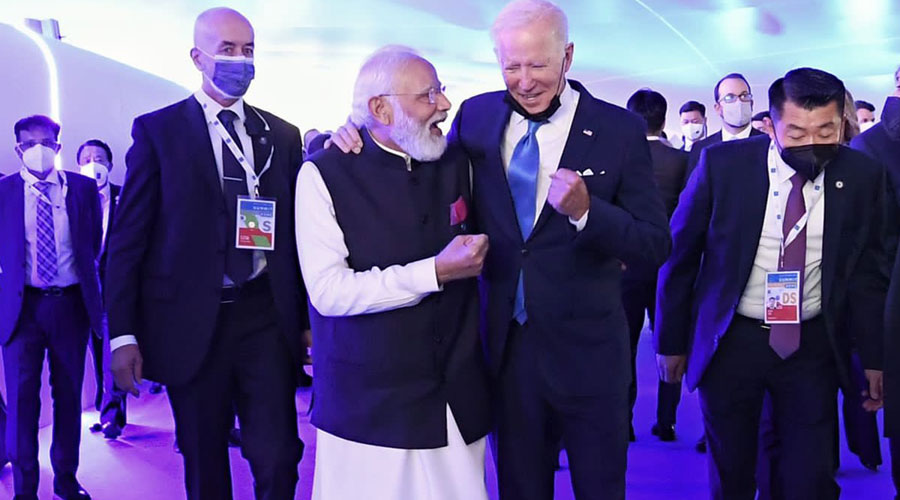The Wall Street Journal, the US-based leading business daily, has carried a full-page advertisement that accuses Indian authorities of decimating “the rule of law by weaponising the institutions of the state to settle scores with political and business rivals, making India unsafe for investment”.
The scurrilous attack could not have come at a worse moment. Union finance minister Nirmala Sitharaman, who is in the US for the World Bank-IMF annual meetings, and 10 other prominent figures from the judiciary and federal investigating agencies were singled out in the vicious attack.
“We have asked the US government to impose economic and visa sanctions against them under the Global Magnitsky Human Rights Accountability Act,” the ad says.
The advertisement set off a storm on Twitter with supporters of the Narendra Modi government slamming the newspaper for allowing the “vile” attack.
The Global Magnitsky Human Rights Accountability Act of 2016 empowers the US government to sanction foreign government officials, freeze their assets and stop them from entering the country for “human rights violations”.
The original act was passed in 2012 and signed into law by President Barack Obama. It was intended to punish Russian officials responsible for the death of a Russian tax lawyer, Sergei Magnitsky, in a Russian prison in 2009. The act has been used against the Saudi conspirators involved in the killing of Jamal Khashoggi, the Myanmar army brass involved in the Rohingya conflict and Chinese officials believed to be responsible for human rights violations in the Xinjiang Uyghur Autonomous Region.
Dubbed as the Magnitsky 11, those named in the ad, besides Sitharaman, include Antrix Corp chairman Rakesh Sasibhushan, solicitor-general Tushar Mehta, two Supreme Court judges, a CBI officer and senior Enforcement Directorate officials.
Who is behind it?
It is believed that the ad was orchestrated by a disgruntled Indian businessman, Ramachandran Viswanathan, and his supporters.
Viswanathan is a former CEO of Devas, a company that was incorporated in December 2004 to develop a platform to deliver multimedia content via satellite and terrestrial systems.
Devas struck a deal in January 2005, when the Manmohan Singh government was in power, with Antrix Corporation, a marketing arm of India’s department of space, to lease capacity in the S-band (2500MHz to 2690MHz) on two primary satellites to be launched by Isro. The initial deal was for a lease of 12 years which could be extended by another 12 years.
Devas agreed to pay to Antrix an upfront capacity reservation fee of $20 million per satellite, and lease fees of $9million to $11.25 million a year.
In February 2011, the cabinet committee on security denied the orbital slot in S-band to Antrix for any commercial activities and annulled the contract.
Devas and Antrix Corporation have been locked in a legal battle ever since. The courts in India have ruled against Devas.
In January this year, the two Supreme Court judges upheld the winding up of Devas Multimedia. “It is a case of fraud of a huge magnitude which cannot be brushed under the carpet,” the judges ruled.
Devas has hauled Antrix and the government to international arbitration and won a $1.2-billion award that it is trying to unsuccessfully enforce in India.
A US court has allowed Devas to seize cash and assets owned by Antrix Corp in that country. It has also started proceedings to seize assets owned by Indian state-owned entities. It has claimed it has been able to seize assets worth $30 million owned by the Airports Authority of India that were in the custody of the International Air Transport Association, the trade association that represents the interests of the global airline industry.
The Indian agencies have hit back at Devas. In June this year, the Enforcement Directorate moved a Bangalore court, urging it to declare Viswanathan a “fugitive economic offender” in connection with the failed 2005 satellite deal with Antrix Corp.
The agency had filed a money-laundering case in 2015 to probe an alleged Rs 578-crore “wrongful” gain that Devas had made at the expense of Antrix.
The CBI has an FIR registered against Antrix executive director K.R. Sridhara Murthi, Devas Multimedia and unnamed officials of Antrix, Isro and the department of space.
Till Saturday evening, neither the Indian finance minister nor the federal agencies had made any public comment on the advertisement.
A photograph of The Wall Street Journal page was shared on Twitter by Indian American Asha Jadeja Motwani, an entrepreneur. “Full page ad war on India’s growth & progress in WSJ. These are deep-pocketed Hindu haters, pretending this is a war on Modi. Shame on Wall Street Journal for allowing such misinformation & lies,” Motwani tweeted.












